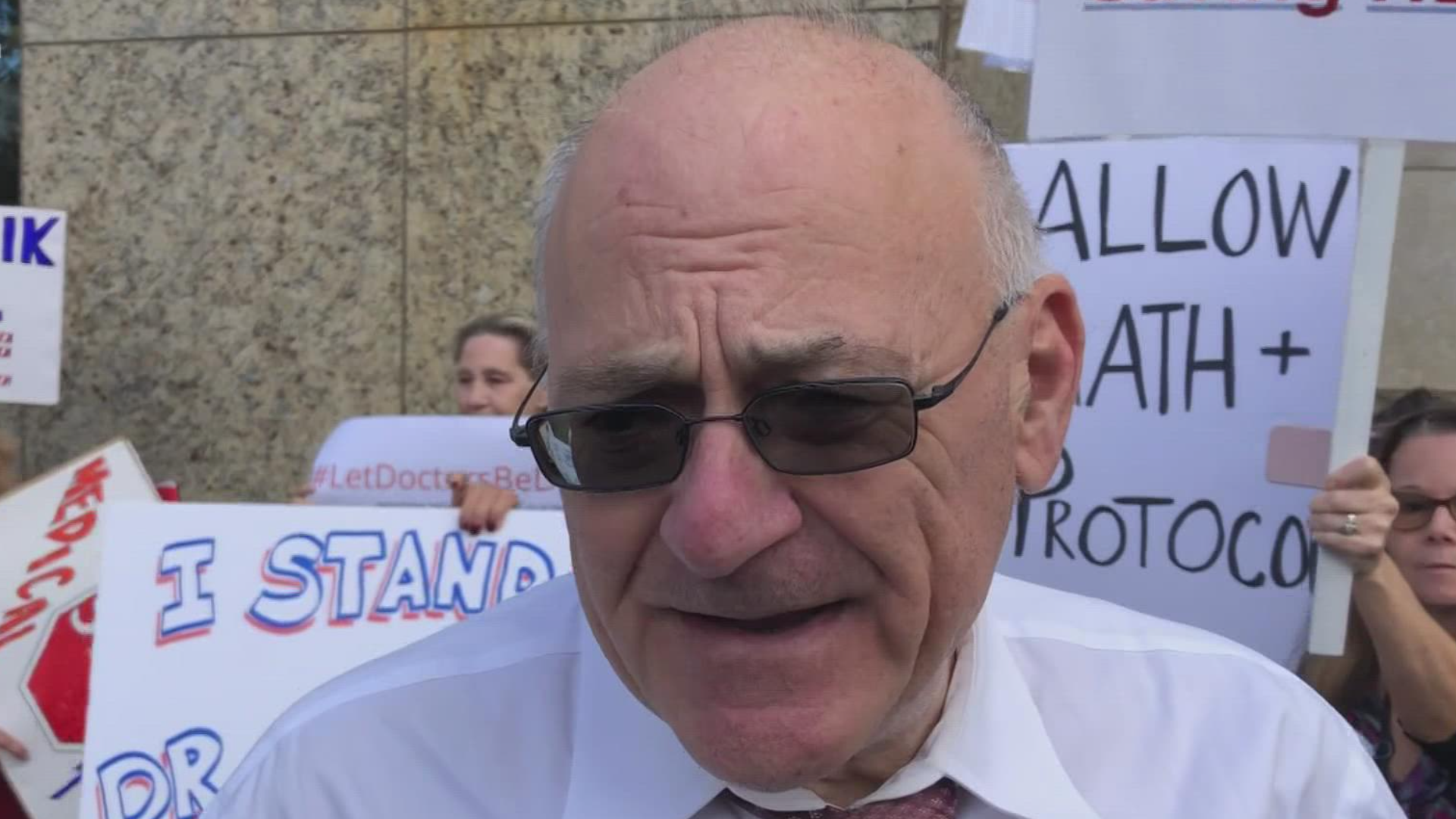NORFOLK, Va. — A Norfolk doctor who is suing Sentara Healthcare will return to work at the General ICU this weekend while he awaits a ruling from a Norfolk Circuit Court judge.
Dr. Paul Marik, an EVMS physician who works under contract at Sentara Norfolk General Hospital, is suing to be able to use ivermectin and other drugs to treat COVID-19 patients.
Sentara Healthcare recently banned ivermectin for COVID-19 treatment, citing recommendations from national health organizations that say the drug could be unsafe and ineffective.
Ivermectin is an anti-parasitic drug that has limited approved uses for people. The FDA and CDC have not authorized or approved ivermectin for use in preventing or treating COVID-19.
Merck, the manufacturer of ivermectin, also does not recommend its use for COVID-19 treatment, saying there's "no scientific basis for a potential therapeutic effect against COVID-19 from pre-clinical studies" and "a concerning lack of safety data in the majority of studies."
Sentara's recently updated COVID-19 treatment guidelines say there isn't enough data to justify the drug's use, plus "concentrations needed to inhibit [COVID-19] would be difficult to achieve in humans and are extremely toxic."
During a hearing Thursday, Norfolk Circuit Court Judge David Lannetti told lawyers that he will take a few days to submit an order on Marik's lawsuit.
Lannetti added that he understands the nature of the COVID-19 pandemic warrants a quick response.
He said he is not concerned with which treatments are appropriate for COVID-19, but he's looking at legal standing and whether Marik can override Sentara's guidelines.
Sentara says eight patients received ivermectin for COVID-19 treatment before the drug was prohibited by the hospital system last month.
Marik testified in court Thursday that he's never prescribed it at Sentara, although he said he'd like to use it as one of the medications he endorses as part of the MATH+ protocol that he helped create.
A large group of protesters rallied outside the Norfolk Courthouse Thursday in support of Marik, calling him a "hero" and "lifesaver," hugging him, and singing "For He's a Jolly Good Fellow."
"What [Sentara] is basically doing is telling me how to treat patients, what to use and what not to use," Marik said outside the courthouse before the hearing. "These are very sick people who are dying, don’t they have compassion; I’m trying my best to save their life."
Kathy Jankusky, a Charlotte, North Carolina resident who traveled to Norfolk to support Marik, said her brother Rob died three weeks ago after receiving a COVID-19 diagnosis.
Jankusky said she wanted Rob to receive experimental COVID-19 treatments.
She said she had been following the work of the Front Line COVID-19 Critical Care Alliance (FLCCC) - a non-profit organization Marik helped create - and believed ivermectin and a mixture of vitamins and steroids could have saved his life.
"It's very standard for us to repurpose medicines, we always have, but for this one health crisis, a major pandemic, we're being denied," she said. "It was too late, he died."
Jankusky said she believes in alternative treatment methods for COVID-19 after looking up information online.
"I mean, the internet, I'm following the FLCCC and did I find that on the internet, absolutely," Jankusky said. "I've listened to those different seminars, do you call that the internet, it's factual information, that's where I'm getting my information from."
Dr. Dennis Petrocelli, a psychiatrist based in Richmond, also rallied in support of Marik's efforts and lawsuit Thursday.
“The lack of endorsement by the CDC and FDA should have no bearing on that informed consent discussion, where before a patient is treated for anything they know the risks, benefits and alternatives to what’s being proposed," Petrocelli said. "Should the doctor say, 'This is not recommended by the CDC,' sure, you could say that."
Petrocelli argued it would be beneficial for Marik and other doctors to be able to use alternative or experimental treatments, regardless of concerns about safety from national health organizations.
"The immediate question is for someone that’s dying in the United States: why can’t we try, why can’t that be the study?" he said. "Yes, it’s open-label and there are limitations there, but that’s still data."
Marik is able to recommend ivermectin and other drugs that are "not endorsed" by the hospital, but he can’t prescribe them, per Sentara policy.
In the hearing, Marik told the judge it would be "cruel" to tell patients who are close to death that he believes in alternative treatments that he can’t provide, while patients are often too sick to move for treatment elsewhere.
Sentara attorneys and Dr. Joel Bundy, Chief Quality and Safety Officer for Sentara Healthcare, told the judge that a group of doctors conducted a "rigorous" review process before banning the use of ivermectin for COVID-19 treatment.
The other medications that are "not endorsed" by Sentara for COVID-19 treatment and limited to clinical trials include: Ascorbic Acid (Vitamin C), Bicalutamide, Etoposide, Fluvoxamine, Dutasteride, and Finasteride.
After the hearing, Marik told 13News Now that he supports the use of ivermectin and these medications in the treatment of COVID-19 patients due to a variety of international studies and trials.
He said ivermectin is approved in countries where "Big Pharma have no influence" and referenced results in Japan.
"The Tokyo Medical Association chair on the 22 of August basically approved the use of ivermectin for every single patient in Japan with COVID, so somehow it's safe and effective in Japan," Marik said.
However, the Japanese government has not approved ivermectin to treat COVID-19.
The Tokyo Medical Association is a professional organization that's not affiliated with the government. It can make policy recommendations, but it's not part of the Japanese Ministry of Health.
Additionally, a study that Marik co-authored in a medical journal to support alternative COVID-19 treatments was recently retracted by the journal due to inaccurate data.

